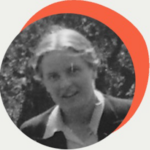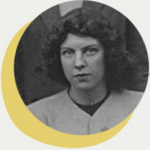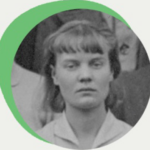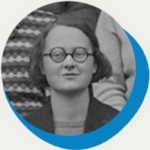 G. E. M. Anscombe was born in 1919 and studied Classics at St Hugh’s College, Oxford (1937-41). After graduating, Anscombe held a studentship at Newnham College, Cambridge (1942-5), before returning to Oxford for a research fellowship at Somerville College (1946-52). She remained at Somerville until 1970, when she became Professor of Philosophy at Cambridge. She retired in 1986 and died in 2001. Anscombe was married to fellow-Catholic and philosopher Peter Geach, with whom she had seven children.
G. E. M. Anscombe was born in 1919 and studied Classics at St Hugh’s College, Oxford (1937-41). After graduating, Anscombe held a studentship at Newnham College, Cambridge (1942-5), before returning to Oxford for a research fellowship at Somerville College (1946-52). She remained at Somerville until 1970, when she became Professor of Philosophy at Cambridge. She retired in 1986 and died in 2001. Anscombe was married to fellow-Catholic and philosopher Peter Geach, with whom she had seven children.
Anscombe is best known for her essay ‘Modern Moral Philosophy’ and her monograph Intention, both of which are foundational texts in their respective domains – ‘Modern Moral Philosophy’ for virtue ethics and Intention for philosophy of action. She translated Wittgenstein’s Philosophical Investigations. In 1956 she protested Oxford’s decision to award an honorary degree to Harry S. Truman on the grounds that he was guilty of mass murder.
Find out more at Mapping the Quartet
 Philippa Bosanquet was born in 1920 and studied PPE at Somerville College, Oxford (1939-42). During the war (1943-5) she worked as an economist in London, living with Iris Murdoch. She returned to Somerville College in 1945 and remained there until 1969. She then held visiting professorships at Los Angeles and Berkley, Washington, Princeton, Stanford and CUNY. She spent 15 years at University of California, LA (1976-91), before returning to Oxford. She died in 2010. Between 1945 and 1960 she was married to historian MRD Foot.
Philippa Bosanquet was born in 1920 and studied PPE at Somerville College, Oxford (1939-42). During the war (1943-5) she worked as an economist in London, living with Iris Murdoch. She returned to Somerville College in 1945 and remained there until 1969. She then held visiting professorships at Los Angeles and Berkley, Washington, Princeton, Stanford and CUNY. She spent 15 years at University of California, LA (1976-91), before returning to Oxford. She died in 2010. Between 1945 and 1960 she was married to historian MRD Foot.
Foot is best known for two important early articles, ‘Moral Beliefs’ and ‘Moral Arguments’ (1959) and her last monograph Natural Goodness (2001). Her life’s work is an attempt to overcome ethical noncognitivism through a form of ethical naturalism. In an exchange with GEM Anscombe about abortion and the doctrine of double-effect (1967), Foot illustrated a distinction between negative and positive rights with the example of a runaway trolley, an example that has (regrettably) spurned an entire branch of moral philosophy!
Find out more at Mapping the Quartet
 Iris Murdoch was born in Dublin in 1919 and studied Classics at Somerville College, Oxford (1938-42). During the war, she worked for the Treasury in London and lived with Philippa Foot. Afterwards she went to Austria for UNRRA, working in a camp for Displaced Persons. In 1946 she was awarded a fellowship to study at Vassar College, New York but was denied a visa due to her former membership of the Communist Party. She held a studentship at Newnham College, Cambridge (1947) before becoming a fellow of St. Anne’s College, Oxford (1948-63). From 1963 she lectured at the RCA. She was married to John Bayley from 1956 until her death in 1999.
Iris Murdoch was born in Dublin in 1919 and studied Classics at Somerville College, Oxford (1938-42). During the war, she worked for the Treasury in London and lived with Philippa Foot. Afterwards she went to Austria for UNRRA, working in a camp for Displaced Persons. In 1946 she was awarded a fellowship to study at Vassar College, New York but was denied a visa due to her former membership of the Communist Party. She held a studentship at Newnham College, Cambridge (1947) before becoming a fellow of St. Anne’s College, Oxford (1948-63). From 1963 she lectured at the RCA. She was married to John Bayley from 1956 until her death in 1999.
Murdoch is best known for The Sovereignty of Good (1970), a collection of three lectures which includes the famous ‘M and D’ example in which a mother-in-law comes to see her daughter-in-law justly. Her philosophy combines analytic method with ideas from Plato, Sartre and Freud. It has given rise to moral particularism and sparked interest in the ethical role of literature. She had great success as a novelist, winning the Booker Prize (1978) for The Sea, the Sea.
Find out more at Mapping the Quartet
 Mary Scrutton was born in 1919 and studied Classics at Somerville College, Oxford (1938-42). During the war she worked in the Civil Service before returning to Oxford to begin a PhD with E. R. Dodds on Plotinus. She taught for four terms at Reading (1949-50). In 1950 she married fellow-philosopher Geoffrey Midgley and moved with him to Newcastle upon Tyne. When their three children were teenagers she took a teaching post at Newcastle University, where she remained until the department’s closure in 1980. She died in 2018.
Mary Scrutton was born in 1919 and studied Classics at Somerville College, Oxford (1938-42). During the war she worked in the Civil Service before returning to Oxford to begin a PhD with E. R. Dodds on Plotinus. She taught for four terms at Reading (1949-50). In 1950 she married fellow-philosopher Geoffrey Midgley and moved with him to Newcastle upon Tyne. When their three children were teenagers she took a teaching post at Newcastle University, where she remained until the department’s closure in 1980. She died in 2018.
Midgley is best known for her book Beast and Man and for her public support of Gaia theory. She wrote about human nature at a time when the subject was taboo and was one of the first philosophers in Britain to take animals and nature seriously as philosophical topics. She wrote for the public about the necessity of ‘philosophical plumbing’—the task of understanding and transforming our concepts, especially when those concepts are out of date or causing practical problems. She was a fierce advocate for the history of ideas.
Find out more at Mapping the Quartet
